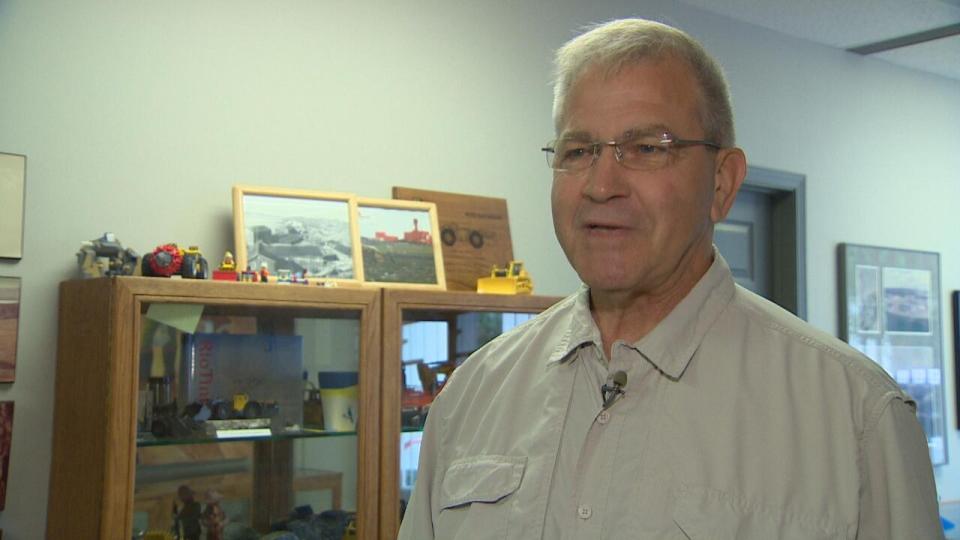Federal gov't, Saskatchewan Research Council swipe sale of N.W.T. rare earth metals from Chinese buyer
Vital Metals announced Monday that it's selling its stockpiled rare earth material to the Saskatchewan Research Council for $3.3 million. This material comes from the North T deposit at the Nechalacho mine, 110 kilometres from Yellowknife.
Natural Resources Canada, along with Energy and Natural Resources Minister Jonathan Wilkinson, directly facilitated this transaction, which has the effect of keeping rare earth materials out of Chinese hands.
Vital Metals previously said back in December it planned to sell the stockpile to Chinese company Shenghe Resources for $2.6 million. This planned sale had been announced along with the news that Shenghe had purchased a 9.9 per cent stake in the Australia-based mining company.
"During the process, we became aware of a high-level interest in keeping the materials in Canada, for Canada," said Geordie Mark, managing director and CEO of Vital Metals.
"It shows the government of Canada recognizes the value of keeping the resources in the country. For us, we agree. We see the value of building a North American supply chain of rare earth materials."
In December, N.W.T stakeholders greeted the news Vital was taking Chinese investment with disappointment, since the Nechalacho mine project had been marketed as a way for Canada to reduce Chinese dominance in the rare earth materials market.
Similarly, the federal government was also concerned about Chinese involvement.
"We have been clear that the government of Canada will take steps to develop secure domestic critical minerals value chains to reduce foreign reliance, and to create jobs and economic opportunities here in Canada," said Natural Resources Canada in an emailed statement.
"We have also been clear that we will not hesitate to take action to protect national security and ensure critical minerals development benefits Canadians and our like-minded partners. As Minister Wilkinson has said, when it comes to financing questions from mining companies operating in Canada, the answer cannot simply be investment from Chinese state-owned industries."
The statement adds that this intervention from the government of Canada reflects a concern for national security.
The Saskatchewan Research Council offered similar motivations for pursuing the purchase of the rare earth stockpile.
"This deal will ensure Canada's critical mineral security for our allies and partners and prevent strategic rare earth minerals from being sent to China," said Jeremy Harrison, Saskatchewan's minister responsible for the council, in an emailed statement.
Minerals to be processed in Canada
The council said the rare earth materials acquired in this sale will be processed in their rare earth processing facility, but beyond that it is unclear what the government intends to do with the stockpile.
The soon-to-be-operational facility, which is the first of its kind in Canada, is only equipped to process monazite concentrate. However, the stockpile coming from Vital Metals is primarily rich in bastnaesite, according to Mark, which requires a different process than monazite to be made into usable material.
Beyond being rich in bastnaesite, Mark said he could not comment on the amount or makeup of the stockpile sold to the council.
Natural Resources Canada declined all interview requests from CBC unless they were attributed to an unnamed senior government source.
The research council also declined to comment beyond the emailed statement provided.
N.W.T mining experts react to sale
N.W.T mining experts, who previously had opposed the Shenghe investment in Vital Metals, expressed renewed positivity to the news of a change in buyers for Nechalacho's rare earth materials.
Bill Braden, a former N.W.T. MLA who spent two years doing communications for Vital's Canadian subsidiary, Cheetah Resources, said it's a change he's happy to see.
He had initially expressed a feeling of "betrayal" at the announcement of Vital Metals partnering with a Chinese company.
"What bothered me about it was a Canadian resource that was originally envisioned as being a part of a Canadian critical mineral supply chain was actually going to China. Absurd!" said Braden. "So I'm very happy to see this turn of events. It's a good move and I'm pleased that Canada has taken a tough stand on this and blocked the entry of Canada's resources into China."
However, Braden expressed concern about what the Saskatchewan Research Council plans to do with the stockpile.
"It's a little bit of a mystery as to why the [council] is buying this stuff, because my understanding is that they are not equipped to process it," said Braden.
Braden said he is also concerned about Vital Metals' consistently low stock prices.

Tom Hoefer, senior adviser of the N.W.T. and Nunavut Chamber of Mines, said he supports the research council buying the stockpile.
"I was pleased because this is a more consistent action to Canada's critical mineral strategy," said Hoefer. "This move to keep those minerals in Canada is a step in the right direction."
Hoefer expressed hesitancy, though, about a lack of policy development to support Canadian mineral supply projects and this being a one-off situation.
"In my mind, this is a bit of an isolated move that has occurred. The reality is that our explorers and developers are still struggling to raise financing to fill in that early part of the supply chain, to find the mines and get them developed," said Hoefer.
Vital Metals itself has struggled to get its own projects off the ground. It had a rare earth processing facility being built in Saskatoon, but that project closed last fall after its cost ballooned from $20 million to $60 million. The company's Canada subsidiary, Cheetah Resources, also went bankrupt.
In these circumstances, Mark expressed how impactful this sale is to continuing their work.
"It's great to get the material moved to either party and then be able to put those dollars further into the project," said Mark. "This will certainly enable us to keep going at Nechalacho for some time."

 Yahoo News
Yahoo News 
